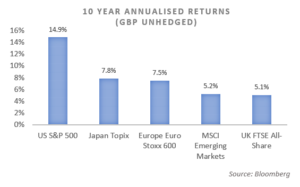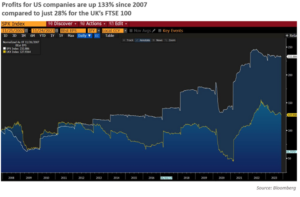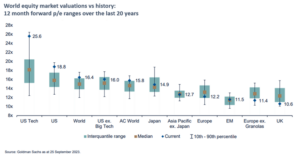I had two client questions in this week. Here they are:
1. Just the one outstanding question for IPS regarding the US: We have c. 50% exposure to US equities
a. What is the upside to the US market given current low growth, high inflation?
b. Doesn’t it suggest investments are likely to decrease rather than increase in value?
2. A friend in the summer was telling us he asks his advisers NOT to invest anything in UK funds because they don’t perform as well as foreign – is this the case?
These are good (and fair) questions. I also like them because they encapsulate the two extremes of the equity of the market today. To answer the second question first, yes the UK has been the worst performing major market over the last 10 years at least:

Now bear in mind when you look at these numbers that longer-term equity returns (and I mean for the last 100 years or more in the US and UK) have averaged around 7%-9% per annum. These returns (as a group) do not look out of line with that and this has been a period that had Brexit, Trump, a global pandemic, inflation coming back with a vengeance and war returning to mainland Europe. In the short term, things happen. In the longer term it has paid (and I think it will continue to pay) to be optimistic that the world and global economy is strong enough to recover and move on.
To address question 1, the US, of course, stands out as the exceptional performer over the last decade. I have written before that I think the worst is over for US inflation. Instead, here I will focus on US equity valuations. As equity investors, you are ultimately the owners of the profits made by the companies you invest in. As these profits grow, so does your investment. Simply put, the US has done a much better job of growing its profits than the rest of the world over the last decade and more:

The main reason for this has been that much of the incremental growth in global profits has gone to US based software and technology driven businesses. Google has taken a large chunk of advertising revenues, Amazon of retail revenues and Apple of discretionary spend. Microsoft license fees remains a tax it seems all businesses large and small have to pay. Businesses on the wrong side of these changes (such as retailers, legacy media, many manufacturers) have really struggled and these are the sorts of businesses you are more likely to find in the UK, Europe and Japan.
Now all of this is, by now, widely known by the market and reflected in today’s prices. US equities are “expensive” in the same way that a flat in Clapham is expensive. You are paying a high price for earnings today but you expect those earnings (like London rental values) to grow faster than other markets over time. Given the lead US technology businesses have and the economies of scale they enjoy, I’d be reluctant to bet the trends we have seen over the last few years reversing anytime soon.
That said, as I wrote a couple of weeks ago, the UK really is very cheap today. We have a major UK bank (which I am not allowed to name for compliance reasons) trading at 4 times earnings and returning around 15% in cash each year to shareholders via dividends and share buybacks. Not much has to go right here for you to make your 7%-9% equity return! It’s possible that a flat in Grimsby (and apologies to any Grimsby readers, I have never been there, I speak from ignorance) is a better investment than a flat in Clapham just because of the higher cashflow yield you can make on it today. And today’s valuation levels do look extreme:

To bring this back to the client questions I started with: first, yes it is possible that the US market will still be a good place to invest in spite of today’s valuations and macro headwinds. The lead the US has in technology is real and valuable. But to the second client question I would say the future has a habit of being different from the past. Emerging markets were the stars of equity markets from 2001 to 2007 but have struggled ever since (in spite of their higher GDP growth). The fact that the UK has under-performed for the last 10 years means that it is cheap and at some point that cheapness will translate into opportunity. I think we are there today from a valuation perspective. Unfortunately, the data shows that valuation is a pretty useless predictor of returns over the next 12 months, but if you can hold your nerve I think your bravery will be rewarded over the longer term.
If you look at what we do rather than what we say, then the truth is we believe in both the UK and US. We maintain a core allocation to the faster growing US markets but balance this with investments in the (now much cheaper) rest of the world including, of course, the UK. This balanced approach broadly worked over the last decade. I have no reason to think it won’t over the next one.
For those that don’t know, I head the investment team at IPS Capital. Each week I highlight a few things that have come across my desk that I think are interesting and investment related. We always welcome dialogue so if you have any questions we’ll be happy to answer them here too.
Chris Brown, CIO
cbrown@ipscap.com
The value of investments may fall as well as rise and you may not get back all capital invested. Past Performance is not a guide to future performance and should not be relied upon. Nothing in this market commentary should be read as or constitutes investment advice.




